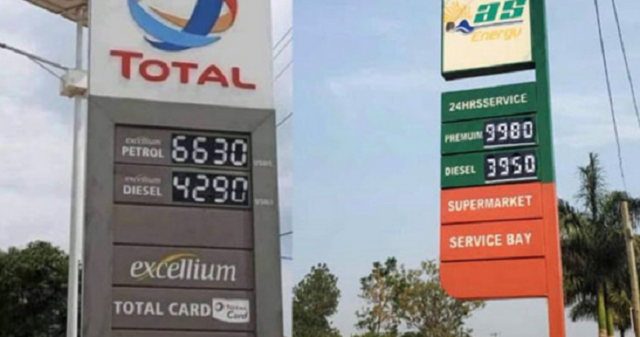
BY Jumah Kakokmo
The government has been advised to expeditiously intervene in the skyrocketing prices of fuel in the country that have commenced.
Fuel Prices at pump stations around Kampala hit the highest levels since November 2022 on Monday, as the local industry blamed the development on global factors. Prices have been rising since early August, reversing the one-year trend that had seen a liter of Petrol stand at an average of 4,800 Shillings and diesel at 4,600 at the main dealer’s Shell and Total Energies.
Recently some Shell Stations quoted a liter of petrol at 5,410 Shillings while others smaller and newer marketers put it at 5,100, an increase of 600 Shillings in a month. The Ministry of Energy and Mineral Development, in their update statement, attributed the changes in the global increase in crude oil prices which is in turn blamed on the scarcity of the raw materials.
The local prices have also been influenced by the recent increase in the foreign exchange rate, according to the ministry, from 3,583 shillings on August 5 to 3744 on August 13 and have hovered around that rate since then. Earlier in May, several members of the Organization of Petroleum Exporting Countries (OPEC) and its allies like Russia dubbed OPEC+ started cutting crude output to force a demand-driven increase in prices.
This followed a sharp decline in prices as the global economic recovery slowed down to levels that had not been expected, while there were threats of recessions in major economies in Europe, the UK, and the USA. The leading suppliers, Saudi Arabia and Russia have cut production by between 500,000 and 1 million barrels per day, greatly affecting global supply.
While for Saudi Arabia it is deemed basically an economic move, Russia’s supply cuts are reportedly part of its weaponry against the West’s sanctions over its war on Ukraine. As a result, crude oil prices have risen to 88.7 dollars a barrel by Monday, the highest level in nine months.
Fears are that the prices could continue rising as the two main suppliers maintain or even increase cuts. Analysts say Saudi Arabia is yet to realize the expected benefits of their oil cuts because its economic slump continues, due to the low demand limiting revenues.
On the other hand, while Russia is experiencing a revenue boom, it is seeing the benefits of further limiting cuts to finance its war on Ukraine and withstand the sanctions. The country’s industry leaders say the Kremlin is likely to make further months in September and October.
In a commentary, Acme Investment Advisors say the shortage in supply is being limited by the increase in output by the US since June, to 12.8 million barrels compared to 12.6 million in May.
The Ministry of Energy puts the current global demand at 103 million barrels a day as of June, which is slightly higher than the 102.1 million that had been forecast by the International Energy Agency.
The ministry says it expects the prices to rise further before stabilizing because of the expected further output cuts by the OPEC+ groups. Oil experts say the effects of the changes on the global crude market take two to three months to be noticed in non-oil companies like Uganda. “These price increases are directly affecting the cost of fuel imported into Uganda, which in turn influences domestic fuel prices,” the statement said, adding that the prices in Uganda remain competitive.
The ministry said the government will continue monitoring the situation “and exploring strategies to enhance the security of supply of petroleum products in Uganda since the scarcity of fuel in the country can trigger a pricing crisis.” Uganda imports most of its petroleum products through Kenya and is currently said to be the most expensive country in the region to buy fuel from.
Last month, Kenya announced a return of fuel subsidies, a year since they were scrapped by the previous government, setting the maximum price of petrol at 1.35 dollars (5,050 Uganda shillings).
Saturday Muhwezi, head of transport and defense at Kisenyi bus terminal Kampala says as bus operators they are currently calm observing the situation and once it goes beyond their control, they are also to make slight changes in transport charges.
“We are still calm about this situation and we have our leadership, once it goes beyond our control, we are soon some slight increase in transport tariffs,” Muhwezi added.
Muhammad Ssempijja, one of the taxi operators leaders in Kampala specifically at Namayiba taxi park says if the prices of fuels continue skyrocketing without any control from the government nothing else will be done except increasing transport tariffs.
“In case the prices of fuel increase leads to the rise of prices of other goods and services thus leaving many Ugandans in pain,” Muhammad added,”






